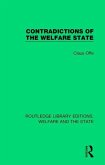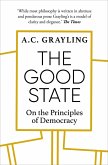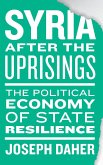Dalia F. Fahmy, Daanish Faruqi
Egypt and the Contradictions of Liberalism: Illiberal Intelligentsia and the Future of Egyptian Democracy
Dalia F. Fahmy, Daanish Faruqi
Egypt and the Contradictions of Liberalism: Illiberal Intelligentsia and the Future of Egyptian Democracy
- Broschiertes Buch
- Merkliste
- Auf die Merkliste
- Bewerten Bewerten
- Teilen
- Produkt teilen
- Produkterinnerung
- Produkterinnerung
A nuanced investigation into the state of liberalism in Egypt
Andere Kunden interessierten sich auch für
![Contradictions of the Welfare State Contradictions of the Welfare State]() Claus OffeContradictions of the Welfare State30,99 €
Claus OffeContradictions of the Welfare State30,99 €![Western Democracy and the AKP Western Democracy and the AKP]() Mehmet Celil ÇelebiWestern Democracy and the AKP33,99 €
Mehmet Celil ÇelebiWestern Democracy and the AKP33,99 €![The Good State The Good State]() A. C. GraylingThe Good State13,99 €
A. C. GraylingThe Good State13,99 €![Seventeen Contradictions and the End of Capitalism Seventeen Contradictions and the End of Capitalism]() David HarveySeventeen Contradictions and the End of Capitalism11,99 €
David HarveySeventeen Contradictions and the End of Capitalism11,99 €![After Repression After Repression]() Elizabeth R. NugentAfter Repression39,99 €
Elizabeth R. NugentAfter Repression39,99 €![Syria after the Uprisings Syria after the Uprisings]() Joseph DaherSyria after the Uprisings114,99 €
Joseph DaherSyria after the Uprisings114,99 €![The Russian Intelligentsia The Russian Intelligentsia]() Richard PipesThe Russian Intelligentsia53,99 €
Richard PipesThe Russian Intelligentsia53,99 €-
-
-
A nuanced investigation into the state of liberalism in Egypt
Hinweis: Dieser Artikel kann nur an eine deutsche Lieferadresse ausgeliefert werden.
Hinweis: Dieser Artikel kann nur an eine deutsche Lieferadresse ausgeliefert werden.
Produktdetails
- Produktdetails
- Verlag: Oneworld Publications
- Seitenzahl: 400
- Erscheinungstermin: 17. Januar 2017
- Englisch
- Abmessung: 224mm x 145mm x 30mm
- Gewicht: 488g
- ISBN-13: 9781780748825
- ISBN-10: 1780748825
- Artikelnr.: 43428985
- Herstellerkennzeichnung
- Libri GmbH
- Europaallee 1
- 36244 Bad Hersfeld
- 06621 890
- Verlag: Oneworld Publications
- Seitenzahl: 400
- Erscheinungstermin: 17. Januar 2017
- Englisch
- Abmessung: 224mm x 145mm x 30mm
- Gewicht: 488g
- ISBN-13: 9781780748825
- ISBN-10: 1780748825
- Artikelnr.: 43428985
- Herstellerkennzeichnung
- Libri GmbH
- Europaallee 1
- 36244 Bad Hersfeld
- 06621 890
Dalia Fahmy is Assistant Professor of Political Science at Long Island University. She lives in New Jersey. Daanish Faruqi is a PhD candidate in History at Duke University, North Carolina.
1 Egyptian liberals, from revolution to counterrevolution Daanish Faruqi
and Dalia F. Fahmy
Introduction
The genealogies of Egyptian liberalism
Structure of the argument
Conclusion: Is liberalism contradictory?
SECTION I: LIBERALISM AND THE EGYPTIAN STATE
2 Egypt's structural illiberalism: How a weak party system undermines
participatory politics Dalia F. Fahmy
The party system in Egypt
Elections in Egypt and why they matter
The parliament as a site of contestation
Political parties after the revolution: A liberal possibility
Participatory politics under SCAF and the rise of the Muslim Brotherhood
The 2015 parliament: The political consolidation of authoritarian rule
Conclusion
3 Nasser's comrades and Sadat's brothers: Institutional legacies and the
downfall of the Second Egyptian Republic Hesham Sallam
The failure of contingent consent
Institutional legacies and the limitations of agency-centered narratives
The origins of the political field
Conclusion
4 (De)liberalizing judicial independence in Egypt Sahar F. Aziz
The three prongs of liberalism: Private, political, and legal liberty
The liberal roots of Egypt's judiciary
Incremental deliberalization in the Mubarak era
A counterrevolution in the courts
Conclusion
SECTION II: LIBERALISM AND EGYPTIAN CIVIL SOCIETY
5 The authoritarian state's power over civil society Ann M. Lesch
The structures of authoritarianism
The post-25 January military regime
Mohammad Morsi's contradictory policies
General Sisi's constriction of the public space
The consolidation of authoritarian control
6 Myth or reality?: The discursive construction of the Muslim Brotherhood
in Egypt Mohamad Elmasry
The Egyptian press system
Disloyal to Egypt
Anti-revolutionary
Conclusion
7 Student political activism in democratizing Egypt Abdel-Fattah Mady
Introduction
Emergence of Egypt's student movement
Student activism under Nasser
Student activism during Sadat's era
Student activism during Mubarak's era
Post-January 25, 2011 revolution
Conclusion
SECTION III: ISLAM, SECULARISM, AND THE STATE
8 Egypt's secularized intelligentsia and the guardians of truth Khaled
Abou El Fadl
9 The truncated debate: Egyptian liberals, Islamists, and ideological
statism Ahmed Abdel Meguid and Daanish Faruqi
Introduction
Liberals and the state: Authoritarian modernism
Islamists and the state: The modernist paradox
Conclusion: Post-Islamism and post-liberalism as post-statism
SECTION IV: EGYPTIAN LIBERALS IN COMPARATIVE PERSPECTIVE POST-2013
10 Conflict and reconciliation: "Arab liberalism" in Syria and Egypt
Emran El-Badawi
Introduction
State advocacy and the beginnings of Arab liberalism
Activism and state opposition: The later development of Arab liberalism
Egypt and Syria no more
Silencing liberal activism in Egypt, ca. 1979-2013
Activists in conflict and artists in reconciliation, Egypt, ca. 2013-
Temporary reconciliation with Assad, Syrian intellectuals, ca. 1982-2012
Conflict, exile and civil war: Liberal activism in Syria, ca. 2000-12
Burhan Ghalioun and Gaber Asfour, ca. 1990-2010
The Arab uprisings, 2011
Ghalioun and the SNC, 2011-12
Asfour, the ministry and Egypt's return to military rule, 2011-14
Rabaa
The limits of Arab liberalism
11 Egypt's new liberal crisis Joel Gordon
Heroes of the revolution
The liberal crisis reconsidered
Postscript: Five years on
12 Egyptian liberals and their anti-democratic deceptions: A contemporary
sad narrative Amr Hamzawy
Liberal ideas at a crossroads
Grand deception one - Sequentialism
Grand deception two - Nothing is more important than...
Grand deception three - The notion of national necessity
Grand deception four - Religion and politics
Grand deception five - The state above everyone and everything
Concluding remarks - Fascist techniques stepped up
Conclusion: Does liberalism have a future in Egypt? Emad El-Din Shahin
A liberal legacy
New beginnings
About the contributors
Index
and Dalia F. Fahmy
Introduction
The genealogies of Egyptian liberalism
Structure of the argument
Conclusion: Is liberalism contradictory?
SECTION I: LIBERALISM AND THE EGYPTIAN STATE
2 Egypt's structural illiberalism: How a weak party system undermines
participatory politics Dalia F. Fahmy
The party system in Egypt
Elections in Egypt and why they matter
The parliament as a site of contestation
Political parties after the revolution: A liberal possibility
Participatory politics under SCAF and the rise of the Muslim Brotherhood
The 2015 parliament: The political consolidation of authoritarian rule
Conclusion
3 Nasser's comrades and Sadat's brothers: Institutional legacies and the
downfall of the Second Egyptian Republic Hesham Sallam
The failure of contingent consent
Institutional legacies and the limitations of agency-centered narratives
The origins of the political field
Conclusion
4 (De)liberalizing judicial independence in Egypt Sahar F. Aziz
The three prongs of liberalism: Private, political, and legal liberty
The liberal roots of Egypt's judiciary
Incremental deliberalization in the Mubarak era
A counterrevolution in the courts
Conclusion
SECTION II: LIBERALISM AND EGYPTIAN CIVIL SOCIETY
5 The authoritarian state's power over civil society Ann M. Lesch
The structures of authoritarianism
The post-25 January military regime
Mohammad Morsi's contradictory policies
General Sisi's constriction of the public space
The consolidation of authoritarian control
6 Myth or reality?: The discursive construction of the Muslim Brotherhood
in Egypt Mohamad Elmasry
The Egyptian press system
Disloyal to Egypt
Anti-revolutionary
Conclusion
7 Student political activism in democratizing Egypt Abdel-Fattah Mady
Introduction
Emergence of Egypt's student movement
Student activism under Nasser
Student activism during Sadat's era
Student activism during Mubarak's era
Post-January 25, 2011 revolution
Conclusion
SECTION III: ISLAM, SECULARISM, AND THE STATE
8 Egypt's secularized intelligentsia and the guardians of truth Khaled
Abou El Fadl
9 The truncated debate: Egyptian liberals, Islamists, and ideological
statism Ahmed Abdel Meguid and Daanish Faruqi
Introduction
Liberals and the state: Authoritarian modernism
Islamists and the state: The modernist paradox
Conclusion: Post-Islamism and post-liberalism as post-statism
SECTION IV: EGYPTIAN LIBERALS IN COMPARATIVE PERSPECTIVE POST-2013
10 Conflict and reconciliation: "Arab liberalism" in Syria and Egypt
Emran El-Badawi
Introduction
State advocacy and the beginnings of Arab liberalism
Activism and state opposition: The later development of Arab liberalism
Egypt and Syria no more
Silencing liberal activism in Egypt, ca. 1979-2013
Activists in conflict and artists in reconciliation, Egypt, ca. 2013-
Temporary reconciliation with Assad, Syrian intellectuals, ca. 1982-2012
Conflict, exile and civil war: Liberal activism in Syria, ca. 2000-12
Burhan Ghalioun and Gaber Asfour, ca. 1990-2010
The Arab uprisings, 2011
Ghalioun and the SNC, 2011-12
Asfour, the ministry and Egypt's return to military rule, 2011-14
Rabaa
The limits of Arab liberalism
11 Egypt's new liberal crisis Joel Gordon
Heroes of the revolution
The liberal crisis reconsidered
Postscript: Five years on
12 Egyptian liberals and their anti-democratic deceptions: A contemporary
sad narrative Amr Hamzawy
Liberal ideas at a crossroads
Grand deception one - Sequentialism
Grand deception two - Nothing is more important than...
Grand deception three - The notion of national necessity
Grand deception four - Religion and politics
Grand deception five - The state above everyone and everything
Concluding remarks - Fascist techniques stepped up
Conclusion: Does liberalism have a future in Egypt? Emad El-Din Shahin
A liberal legacy
New beginnings
About the contributors
Index
1 Egyptian liberals, from revolution to counterrevolution Daanish Faruqi
and Dalia F. Fahmy
Introduction
The genealogies of Egyptian liberalism
Structure of the argument
Conclusion: Is liberalism contradictory?
SECTION I: LIBERALISM AND THE EGYPTIAN STATE
2 Egypt's structural illiberalism: How a weak party system undermines
participatory politics Dalia F. Fahmy
The party system in Egypt
Elections in Egypt and why they matter
The parliament as a site of contestation
Political parties after the revolution: A liberal possibility
Participatory politics under SCAF and the rise of the Muslim Brotherhood
The 2015 parliament: The political consolidation of authoritarian rule
Conclusion
3 Nasser's comrades and Sadat's brothers: Institutional legacies and the
downfall of the Second Egyptian Republic Hesham Sallam
The failure of contingent consent
Institutional legacies and the limitations of agency-centered narratives
The origins of the political field
Conclusion
4 (De)liberalizing judicial independence in Egypt Sahar F. Aziz
The three prongs of liberalism: Private, political, and legal liberty
The liberal roots of Egypt's judiciary
Incremental deliberalization in the Mubarak era
A counterrevolution in the courts
Conclusion
SECTION II: LIBERALISM AND EGYPTIAN CIVIL SOCIETY
5 The authoritarian state's power over civil society Ann M. Lesch
The structures of authoritarianism
The post-25 January military regime
Mohammad Morsi's contradictory policies
General Sisi's constriction of the public space
The consolidation of authoritarian control
6 Myth or reality?: The discursive construction of the Muslim Brotherhood
in Egypt Mohamad Elmasry
The Egyptian press system
Disloyal to Egypt
Anti-revolutionary
Conclusion
7 Student political activism in democratizing Egypt Abdel-Fattah Mady
Introduction
Emergence of Egypt's student movement
Student activism under Nasser
Student activism during Sadat's era
Student activism during Mubarak's era
Post-January 25, 2011 revolution
Conclusion
SECTION III: ISLAM, SECULARISM, AND THE STATE
8 Egypt's secularized intelligentsia and the guardians of truth Khaled
Abou El Fadl
9 The truncated debate: Egyptian liberals, Islamists, and ideological
statism Ahmed Abdel Meguid and Daanish Faruqi
Introduction
Liberals and the state: Authoritarian modernism
Islamists and the state: The modernist paradox
Conclusion: Post-Islamism and post-liberalism as post-statism
SECTION IV: EGYPTIAN LIBERALS IN COMPARATIVE PERSPECTIVE POST-2013
10 Conflict and reconciliation: "Arab liberalism" in Syria and Egypt
Emran El-Badawi
Introduction
State advocacy and the beginnings of Arab liberalism
Activism and state opposition: The later development of Arab liberalism
Egypt and Syria no more
Silencing liberal activism in Egypt, ca. 1979-2013
Activists in conflict and artists in reconciliation, Egypt, ca. 2013-
Temporary reconciliation with Assad, Syrian intellectuals, ca. 1982-2012
Conflict, exile and civil war: Liberal activism in Syria, ca. 2000-12
Burhan Ghalioun and Gaber Asfour, ca. 1990-2010
The Arab uprisings, 2011
Ghalioun and the SNC, 2011-12
Asfour, the ministry and Egypt's return to military rule, 2011-14
Rabaa
The limits of Arab liberalism
11 Egypt's new liberal crisis Joel Gordon
Heroes of the revolution
The liberal crisis reconsidered
Postscript: Five years on
12 Egyptian liberals and their anti-democratic deceptions: A contemporary
sad narrative Amr Hamzawy
Liberal ideas at a crossroads
Grand deception one - Sequentialism
Grand deception two - Nothing is more important than...
Grand deception three - The notion of national necessity
Grand deception four - Religion and politics
Grand deception five - The state above everyone and everything
Concluding remarks - Fascist techniques stepped up
Conclusion: Does liberalism have a future in Egypt? Emad El-Din Shahin
A liberal legacy
New beginnings
About the contributors
Index
and Dalia F. Fahmy
Introduction
The genealogies of Egyptian liberalism
Structure of the argument
Conclusion: Is liberalism contradictory?
SECTION I: LIBERALISM AND THE EGYPTIAN STATE
2 Egypt's structural illiberalism: How a weak party system undermines
participatory politics Dalia F. Fahmy
The party system in Egypt
Elections in Egypt and why they matter
The parliament as a site of contestation
Political parties after the revolution: A liberal possibility
Participatory politics under SCAF and the rise of the Muslim Brotherhood
The 2015 parliament: The political consolidation of authoritarian rule
Conclusion
3 Nasser's comrades and Sadat's brothers: Institutional legacies and the
downfall of the Second Egyptian Republic Hesham Sallam
The failure of contingent consent
Institutional legacies and the limitations of agency-centered narratives
The origins of the political field
Conclusion
4 (De)liberalizing judicial independence in Egypt Sahar F. Aziz
The three prongs of liberalism: Private, political, and legal liberty
The liberal roots of Egypt's judiciary
Incremental deliberalization in the Mubarak era
A counterrevolution in the courts
Conclusion
SECTION II: LIBERALISM AND EGYPTIAN CIVIL SOCIETY
5 The authoritarian state's power over civil society Ann M. Lesch
The structures of authoritarianism
The post-25 January military regime
Mohammad Morsi's contradictory policies
General Sisi's constriction of the public space
The consolidation of authoritarian control
6 Myth or reality?: The discursive construction of the Muslim Brotherhood
in Egypt Mohamad Elmasry
The Egyptian press system
Disloyal to Egypt
Anti-revolutionary
Conclusion
7 Student political activism in democratizing Egypt Abdel-Fattah Mady
Introduction
Emergence of Egypt's student movement
Student activism under Nasser
Student activism during Sadat's era
Student activism during Mubarak's era
Post-January 25, 2011 revolution
Conclusion
SECTION III: ISLAM, SECULARISM, AND THE STATE
8 Egypt's secularized intelligentsia and the guardians of truth Khaled
Abou El Fadl
9 The truncated debate: Egyptian liberals, Islamists, and ideological
statism Ahmed Abdel Meguid and Daanish Faruqi
Introduction
Liberals and the state: Authoritarian modernism
Islamists and the state: The modernist paradox
Conclusion: Post-Islamism and post-liberalism as post-statism
SECTION IV: EGYPTIAN LIBERALS IN COMPARATIVE PERSPECTIVE POST-2013
10 Conflict and reconciliation: "Arab liberalism" in Syria and Egypt
Emran El-Badawi
Introduction
State advocacy and the beginnings of Arab liberalism
Activism and state opposition: The later development of Arab liberalism
Egypt and Syria no more
Silencing liberal activism in Egypt, ca. 1979-2013
Activists in conflict and artists in reconciliation, Egypt, ca. 2013-
Temporary reconciliation with Assad, Syrian intellectuals, ca. 1982-2012
Conflict, exile and civil war: Liberal activism in Syria, ca. 2000-12
Burhan Ghalioun and Gaber Asfour, ca. 1990-2010
The Arab uprisings, 2011
Ghalioun and the SNC, 2011-12
Asfour, the ministry and Egypt's return to military rule, 2011-14
Rabaa
The limits of Arab liberalism
11 Egypt's new liberal crisis Joel Gordon
Heroes of the revolution
The liberal crisis reconsidered
Postscript: Five years on
12 Egyptian liberals and their anti-democratic deceptions: A contemporary
sad narrative Amr Hamzawy
Liberal ideas at a crossroads
Grand deception one - Sequentialism
Grand deception two - Nothing is more important than...
Grand deception three - The notion of national necessity
Grand deception four - Religion and politics
Grand deception five - The state above everyone and everything
Concluding remarks - Fascist techniques stepped up
Conclusion: Does liberalism have a future in Egypt? Emad El-Din Shahin
A liberal legacy
New beginnings
About the contributors
Index








